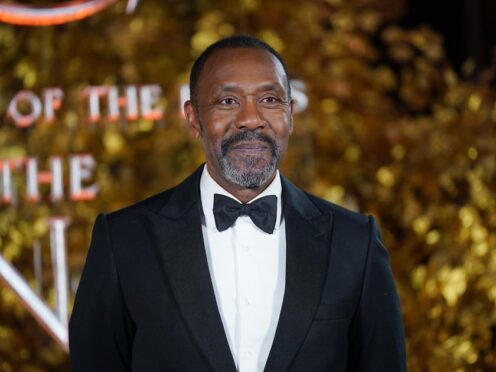Sir Lenny Henry has said he feels fantasy franchises are “trying to be more inclusive” than they were with casting and storytelling.
The 64-year-old comedian and actor stars as Sadoc Burrows in the upcoming Lord of the Rings series titled The Rings Of Power, which is inspired by author JRR Tolkien’s extended notes.
Despite the progress that has been made, he said that some “purists” have more trouble believing that a black actor could play a hobbit or an elf than believing in a dragon.
Reflecting on how fantasy franchises are diversifying more, he told British GQ: “There’s a real sense of trying to be more inclusive than we were in this world.”
However, he noted that House of the Dragon star Steve Toussaint has said that “purists” have been saying things about his casting in the new Games of Thrones prequel series.
“They have no trouble believing in a dragon, but they do have trouble believing that a black person could be a member of the court,” Sir Lenny said.
“Or that a black person could be a hobbit or an elf … storytellers can do what they want, because they’re storytellers.
“In the reimagining of these stories from 1,000 years ago, they are not part of the canon that everybody knows, this is a reimagining and reweaving of the story.
“And (Rings of Power showrunners) JD Payne and Patrick McKay have just gone, ‘What if?’ The greatest two words in storytelling: What if?”
The series, which sees an almost unrecognisable Sir Lenny as a Harfoot – a Hobbit predecessor – is set thousands of years before the events of the world-renowned The Hobbit and The Lord Of The Rings books, and follows the events of the Second Age and the forging of the famous rings.
Unite against the darkness. #TheRingsOfPower debuts September 1 at 9pm ET/September 2 at 2am UK.
Weekly episodes available Fridays at 12am ET, only on @PrimeVideo. pic.twitter.com/TL1Ao1pqRV
— The Lord of the Rings on Prime (@LOTRonPrime) August 30, 2022
Aside from stepping into Tolkien’s popular fantasy world, the actor has also recently featured in Neil Gaiman’s The Sandman in a voiceover role and he will be a lead star in a prequel series for The Witcher.
Sir Lenny said he would have loved to have been involved in the original Lord of the Rings trilogy but added that “change takes a long time”.
Reflecting on the impact of being the only black person in the room during the early days of his career, he said it made him feel like he had to “defend” himself and stand up for what he believed in.
He explained: “”Whenever you walk into a room, and you’re the only black person or the only woman or the only gay person or the only person that has a disability or the only working-class person, you really have an introspective moment of ‘Okay, I’m here again’. It’s just me, right?
“So you feel like you have to defend yourself, you have to kind of stand up for what you believe in and where you’re from.
“So, you spend a lot of time putting forward your point of view, or interpreting your point of view for people who don’t know what you’re talking about.
“What’s great about the last five years, is that people are slowly beginning to understand what we’ve been going on about it for the last 20.”
Read the full interview with Lenny Henry by Ben Allen in British GQ.
